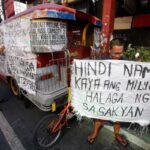However, Cebu City is still allowing pigs and other pork products coming from Negros Island to enter Cebu City directly despite the 30-day ban issued by the Cebu Provincial Government Monday on the entry of pigs and pork products from Negros Island.
The pigs that tested positive in Carcar originally came from Negros Island and were slaughtered along with local pigs at the city’s abattoir, Dr. Daniel Ventura Jr., DA 7 ASF coordinator, said Tuesday.
The local pigs were traced back to the 11 barangays, but Ventura did not identify the barangays.
Samples collected from a Carcar City slaughterhouse were tested for ASF at the Bureau of Animal Industry’s (BAI) Animal Disease Diagnostic and Reference Laboratory last March 1 as part of Carcar City’s ASF surveillance activities. The positive test results prompted the contact tracing.
Ventura said the DA 7 is still looking into the source of and manner in which the virus spread.
“That’s alarming because it would appear the pigs came from the 11 barangays, but if there is a trader or consolidator, who bought the pigs from wherever, he or she could just have put these addresses,” Ventura said in Tagalog.
He added that pigs are not immediately slaughtered when they arrive at the abattoir. There is a rest period of at least 12 hours when all the pigs are placed in a holding pen, so there is a mixing of pigs.
Knives used in the slaughtering of the hogs may also be the cause of the detection or spread of ASF, Ventura added.
He urged hog raisers to maintain the cleanliness of their hog farms to reduce the risk of ASF infection.
“Let us not feed swill to our pigs. And if we go near our pigs, let’s make sure our clothes are clean. We should also not use slippers or boots that were used outside the piggery. We should install a foot bath, and take a shower and change clothes if we are from outside or from facilities where there are pigs,” Ventura said.
Surveillance
Ventura said they have been conducting regular surveillance and monitoring for ASF in the region, particularly in Cebu, which was considered a “green zone,” or an area unaffected by the spread of the disease.
He said that was how they were able to detect the ASF in Carcar City.
He said Carcar City had no ASF cases during their surveillance in September 2022.
He said they conduct surveillance every six months in municipalities and cities that have a hog industry.
Culling
Ventura said culling is not yet an option in Carcar City.
He said they resort to culling, or the humane disposal of livestock animals not intended for human consumption, only when there are rampant deaths of animals in a certain area due to a disease.
“In the case of Carcar, since we were conducting surveillance, we will locate the places where there are active cases of ASF and the pigs are sick. Only then will we apply culling,” he said.
Hogs infected with ASF exhibit symptoms such as fever, vomiting, diarrhea, reddening or darkening of the skin, among others, he said.
Ventura said the DA is still continuing the contact tracing to determine the source of the virus.
“The strategy I see is to enclose the whole province, to isolate, and then search for the virus inside. If you reduce the entry of live pork and products, then the contamination will be greatly reduced,” Ventura said in a mix of English and Tagalog.
Isolate Carcar
On Monday, Cebu Gov. Gwendolyn Garcia issued Executive Order 9-B to “isolate” Carcar City from the rest of the province and strictly implement border control in the city due to the presence of ASF.
“We have isolated Carcar and we have warned all other LGUs (local government units)… The first order of the day is containment,” Garcia told reporters Tuesday.
The Department of Health earlier said ASF is not a risk to human health. It is a “severe and highly contagious viral disease among domestic and wild pigs,” according to the World Organization for Animal Health.
In line with this, lechon vendors in Carcar have been ordered to suspend operations, while manufacturers of pork chicharon (cracklings) were allowed to sell only their old stocks.
For border control, the governor said she had instructed the policemen to put up checkpoints to make sure that no pork supply would leave the area.
Garcia also advised neighboring towns and cities to strictly monitor their pigs, especially in Talisay City, which is also famous for its lechon (roasted pig) business.
Suspected presence
Carcar City Mayor Patrick Barcenas said he began to suspect the presence of the virus in the city last month, which is why he had it examined by the City Veterinary Office and the Provincial Veterinary Office.
Barcenas said he would invite individuals involved in the sale of pork products, such as lechon traders, chicharon makers, restaurant owners and public market stall holders, to a meeting to discuss measures, including the culling of infected pigs, to contain the virus.
Cebu City
Following the development, the Cebu City Government is now implementing a ban on pork products and byproducts coming from Carcar City.
But pigs and other pork products coming from Negros Island can still enter Cebu City directly.
Dr. Jessica Maribojoc, head of the City’s Department of Veterinary Medicines and Fisheries, told SunStar Cebu Tuesday that Executive Order 3 automatically bans pork products, byproducts and live hogs from a locality that has tested positive for the ASF virus.
The city veterinarian said based on the test conducted on March 1, the city remains free from the highly contagious pig-killing disease.
Maribojoc added that the ban on pork products from Carcar City has minimal impact on Cebu City since most of Carcar’s products are chicharon.
Reporting urged
Assistant Agriculture Secretary Salvador Diputado announced Tuesday that the department had launched contact tracing together with BAI personnel from Manila to determine the source of the ASF that was detected in pigs in a slaughterhouse in Carcar City.
In line with this, he urged the public to report any ASF-related incidents in their neighborhood.
“We urge the public to alert our personnel or the LGU if their neighbors’ pigs have died because if they keep silent, our ASF problem will not be solved,” Diputado said.
Mandaue City
Meanwhile, the Mandaue City Veterinary Office debunked reports that Mandaue City has already logged ASF cases.
Dr. Karen Merilles, city veterinarian, said Monday, March 6, that they submitted at least 153 blood samples extracted from the city’s pig farms through the BAI and all tested negative.
Merilles said they continue to submit test samples, but BAI has not confirmed yet if any tested positive for the ASF virus.
On Feb. 27, a news outlet from Bohol had reported about alarming pig deaths in 11 towns and cities in Cebu, including Mandaue City.
Pork producers speak
The Central Visayas Pork Producers Cooperative (CeViPPCo) and fellow hog farmers in Cebu expressed “deep sadness” over the reported ASF cases in Carcar City.
“As Cebu is one of the few provinces that is yet to be affected by ASF, we hope that the measures taken by the Cebu Provincial Government through its Provincial Veterinary Office and the LGU concerned will prevent its spread. We appreciate their continued efforts in protecting hog producers in Cebu,” CeViPPCo chairman Rolando Tambago and president Jonathan Young said in a statement Tuesday.
The cooperative said it is working closely with the Cebu Provincial Government and the Carcar City LGU to monitor the province and prevent the further spread of the disease.
“We urge fellow hog producers in Cebu to implement strict biosecurity measures in their farms and not to panic. Experience has shown that following the biosecurity guidelines and taking prompt action can contain the ASF outbreak. Checkpoints have been set up to control movements of hogs and pork products to/from Carcar City. Continuous disease surveillance with blood sampling for laboratory test is being done and supplemented with Information and Education Campaign,” the cooperative said.
CeViPPCo reminded the consuming public that ASF does not affect humans, “so it is safe to eat local pork.” (with PAC / TPT / LMY, HIC, KOC)



